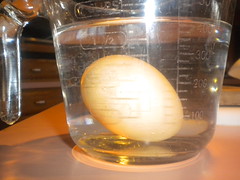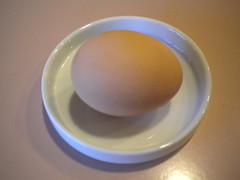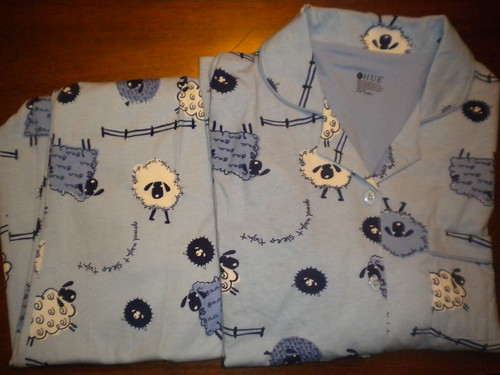We have three chickens in total, which for two years produced enough eggs that I didn't have to buy any and in fact, had to serve an egg-only supper dish once a week just to keep us from getting overrun with eggs, a most happy state of affairs.
Two of them haven't given us eggs for about six months. We are still pondering what to do about that particular situation, as we would like their space in the chicken coop for new, more productive inhabitants.
The third one, Survivor Chicken ("Essie" for short) had been our most reliable producer for some time now. But even she had given up sometime in October, once the days started getting shorter.
(We were able to coax eggs out of all of them for the past two winters -- a very unusual situation -- by religiously giving them all of our non-meat table scraps as a supplement to their usual layer feed mix. We found that, even without the additional light source that is usually necessary, they continued to lay enough eggs to keep us in yolk. They were quite emphatic that no table scraps meant no eggs, however, so I turned into the extremely odd dinner guest -- and really, let's be honest here, I didn't have too far to go -- who would stop people as they went to scrap their plates into the garbage and direct them to a ziploc baggie instead, so I could stockpile the leftover goodness for my hens. This only enhanced my already substantial reputation for weird behavior.)
I really missed our eggs once they stopped rolling in. I watched as our supply steadily dwindled, and found myself hoarding the last few... no more giving away eggs to random people or using them for just any old dish. I couldn't bring myself to break into those last few brown ones, even though the supplemental white ones I purchased from the store seemed so bleached out and fake by comparison. Having our own chickens turned me into an egg snob. Even the store-bought brown ones seem lackluster.
It occurred to me around Christmas that those eggs had been in there an awfully long time, and although eggs, as a rule, are a pretty long-lasting foodstuff, I might have waited a bit too long to use them. Easy enough to test them: all I had to do was submerge them in water.
If the egg sinks to the bottom, it is still plenty fresh.
If one end starts to tilt up, it is getting near the end of its shelf life. Use asap.
If the egg floats, then you are out of luck.* (None of mine floated, so unfortunately/ fortunately, depending on your perspective, I don't have a picture to show you.) Send your kid to the far corner of your property with instruction to toss the egg as far as possible into the woods. Whatever you do, don't break it and try to rinse it down your drain. Just trust me on this one.
The results of my testing session left us home-grown eggless for quite some time. But on Sunday my LSH found this in the chicken coop, complements of Essie:
Three so far this week. My fridge egg container is starting to look healthy again.
* For those of you curious as to why this works: the eggshell is slightly permeable to air. As the egg membrane inside gets older and starts to dry out, it shrinks. This causes air to be drawn into the shell where the membrane used to be. Less membrane = more air, and if there's enough air in there for the egg to float, then you have a genuine rotten egg on your hands. Handle with care!












